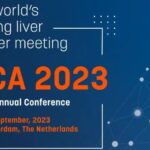Editor’s Note:
Primary liver cancer is one of the common malignant tumors worldwide. With the development of modern biomedical technology, clinical surgical techniques, and minimally invasive treatment techniques, the surgical treatment level of liver cancer has made significant progress. At the recently concluded global academic event in the field of liver cancer - the 17th Annual Meeting of the International Liver Cancer Association (ILCA), Professor Myron Schwartz of Mount Sinai Hospital in the U.S. delivered a keynote report on the progress made in liver cancer surgical treatment in recent years. Our journal specially invited Professor Myron Schwartz for an in-depth interview on the evolution of future liver cancer clinical treatment strategies and the opportunities and challenges that liver cancer surgery will face. Here is the organized content for our readers.
International Hepatology : Liver resection and transplantation are the main means of radical treatment for liver cancer. Could you discuss the latest developments in these surgical methods?
Professor Myron Schwartz : In recent years, liver surgery has developed rapidly. Surgical techniques play an increasingly significant role in liver operations. With advanced surgical techniques, surgeons can perform these operations without making large incisions. For example, laparoscopic techniques, which use video instruments to observe and operate inside the abdomen, are gaining widespread application. They not only reduce the incision size and significantly alleviate the patient’s pain but also reduce bleeding and shorten the patient’s recovery time. Another example is surgical robots, primarily composed of a control console and operating arms, allowing surgeons to operate from a distance. The robot’s flexible “inner wrist” can eliminate the surgeon’s hand tremors, and its unique 3D imaging system can magnify the surgical field 15 times, greatly enhancing the accuracy and stability of the surgery. Currently, laparoscopic surgery and surgical robots are playing an increasingly significant role in liver surgeries in many countries. In Europe, two-thirds of liver resections are done via minimally invasive surgery, a significant advancement in modern surgery.
International Hepatology : In recent years, non-surgical local treatments such as TACE, HAIC, and SBRT have gained widespread attention in liver cancer management. Do you think these advancements are changing the prospects of surgical operations?
Professor Myron Schwartz : With continuous medical advancements, local treatments are playing a more and more important role in liver cancer clinical treatment. On the one hand, the precision of techniques like radiofrequency ablation and microwave ablation has increased. On the other hand, radioembolization has shown definitive therapeutic effects on small tumors, and techniques like stereotactic radiotherapy have made substantial progress. As a result, we are largely shifting from surgical treatments to non-surgical local treatments, achieving good therapeutic effects. These local treatments are increasingly becoming alternatives to surgical operations. With the advancement of technology, this trend will become even more evident. I personally believe that as long as the treatment goal is achieved and patients get the best clinical benefits, it’s a good choice, regardless of whether surgery might be replaced. Even minimally invasive surgery is more complicated than non-surgical treatments, requiring more resources and posing greater risks.
International Hepatology : Immunotherapy as an adjuvant treatment to surgical resection and as a neo-adjuvant treatment is being actively explored. Could you share the research advancements in this field and the potential advantages of combining surgery with immunotherapy?
Professor Myron Schwartz : Just in April this year, the first randomized controlled clinical trial applying immunotherapy as an adjuvant treatment after liver cancer surgery or ablation was reported and achieved very positive results. It will also be approved as a standard treatment method in the U.S. In fact, I personally believe that immunotherapy before surgery has an additional advantage, which is to help the immune system better recognize tumors. In our center, we have launched a series of neo-adjuvant treatment clinical trials, and we believe it has a promising future. In summary, be it adjuvant or neo-adjuvant treatment, we hope to eliminate tumor cells in the body as much as possible and prevent tumor recurrence to the greatest extent, thereby enhancing the likelihood of a complete cure for patients.
International Hepatology : Could you finally summarize the key points from our discussion about the future of liver cancer surgery?
Professor Myron Schwartz : For many years, surgery has been an essential pillar in liver cancer treatment and continues to play a crucial role. However, as more and more local treatment techniques continue to develop and innovate, surgery may be replaced by new technologies. In some cases, patients can achieve the goal of tumor destruction without surgery. Furthermore, with the continuous progress of systemic treatment for liver cancer, a large number of new targeted drugs and immune checkpoint inhibitors have emerged, bringing new hope to countless inoperable liver cancer patients. We believe that the survival of liver cancer patients will see further improvements in the future.


